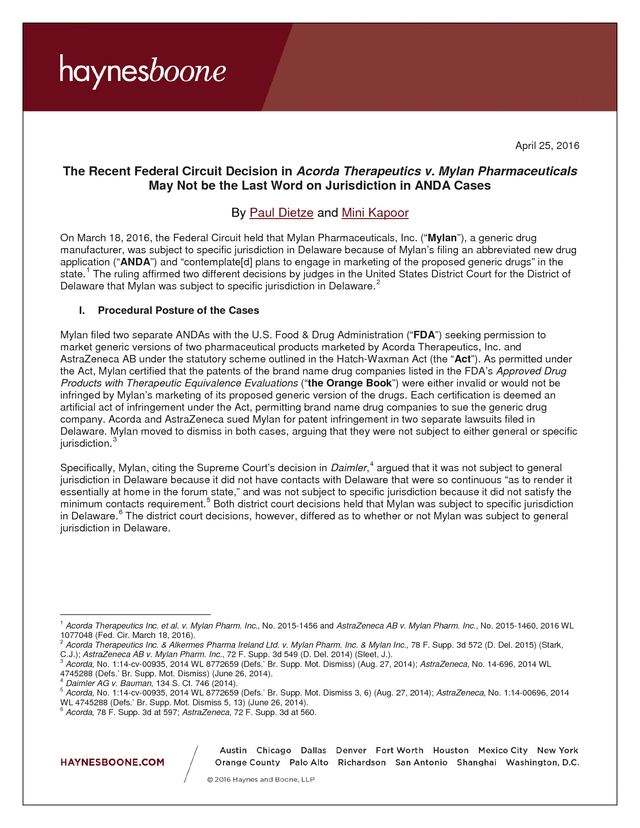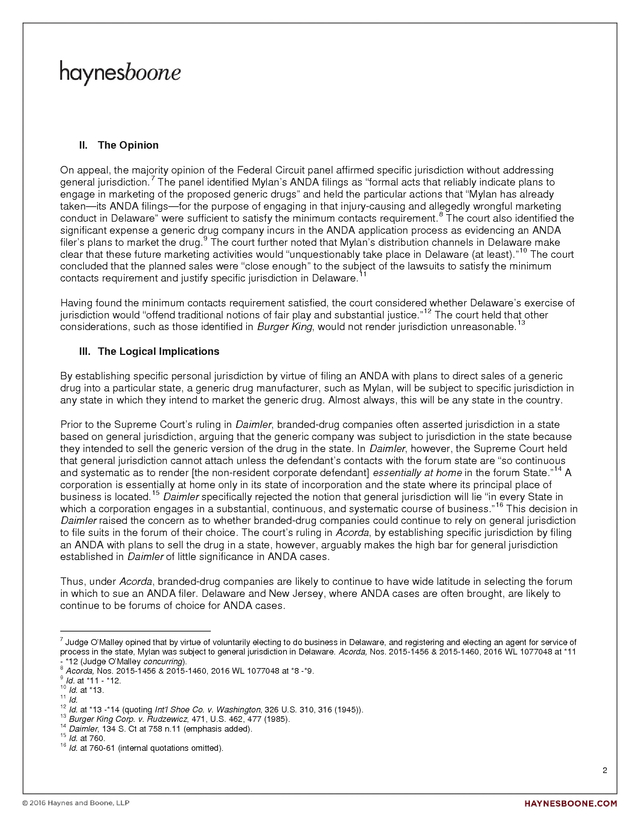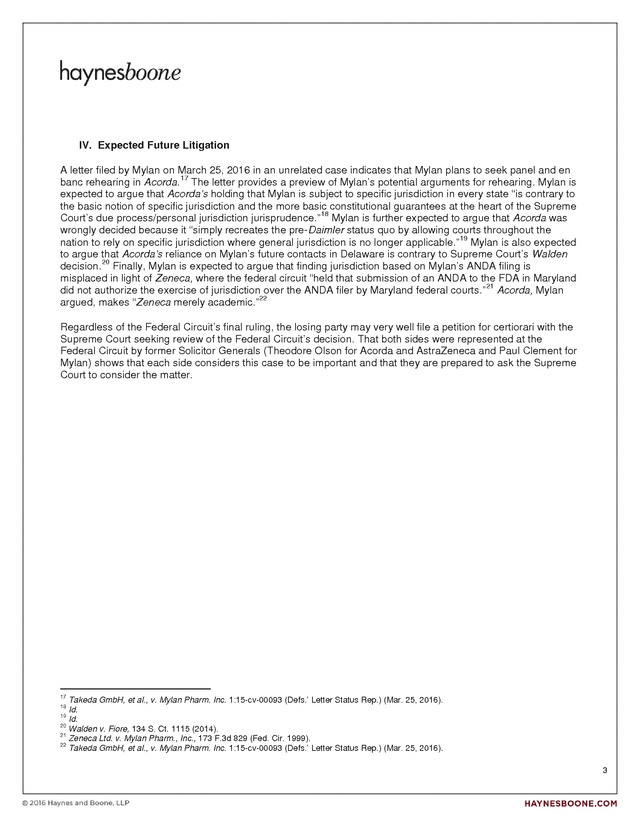The Recent Federal Circuit Decision in Acorda Therapeutics v. Mylan Pharmaceuticals May Not be the Last Word on Jurisdiction in ANDA Cases – April 25, 2016
Haynes and Boone
Description
April 25, 2016
The Recent Federal Circuit Decision in Acorda Therapeutics v. Mylan Pharmaceuticals
May Not be the Last Word on Jurisdiction in ANDA Cases
By Paul Dietze and Mini Kapoor
On March 18, 2016, the Federal Circuit held that Mylan Pharmaceuticals, Inc. (“Mylan”), a generic drug
manufacturer, was subject to specific jurisdiction in Delaware because of Mylan’s filing an abbreviated new drug
application (“ANDA”) and “contemplate[d] plans to engage in marketing of the proposed generic drugs” in the
1
state. The ruling affirmed two different decisions by judges in the United States District Court for the District of
2
Delaware that Mylan was subject to specific jurisdiction in Delaware.
I.
Procedural Posture of the Cases
Mylan filed two separate ANDAs with the U.S.
Food & Drug Administration (“FDA”) seeking permission to market generic versions of two pharmaceutical products marketed by Acorda Therapeutics, Inc. and AstraZeneca AB under the statutory scheme outlined in the Hatch-Waxman Act (the “Act”). As permitted under the Act, Mylan certified that the patents of the brand name drug companies listed in the FDA’s Approved Drug Products with Therapeutic Equivalence Evaluations (“the Orange Book”) were either invalid or would not be infringed by Mylan’s marketing of its proposed generic version of the drugs.
Each certification is deemed an artificial act of infringement under the Act, permitting brand name drug companies to sue the generic drug company. Acorda and AstraZeneca sued Mylan for patent infringement in two separate lawsuits filed in Delaware. Mylan moved to dismiss in both cases, arguing that they were not subject to either general or specific 3 jurisdiction. 4 Specifically, Mylan, citing the Supreme Court’s decision in Daimler, argued that it was not subject to general jurisdiction in Delaware because it did not have contacts with Delaware that were so continuous “as to render it essentially at home in the forum state,” and was not subject to specific jurisdiction because it did not satisfy the 5 minimum contacts requirement.
Both district court decisions held that Mylan was subject to specific jurisdiction 6 in Delaware. The district court decisions, however, differed as to whether or not Mylan was subject to general jurisdiction in Delaware. 1 Acorda Therapeutics Inc. et al.
v. Mylan Pharm. Inc., No.
2015-1456 and AstraZeneca AB v. Mylan Pharm. Inc., No.
2015-1460, 2016 WL 1077048 (Fed. Cir. March 18, 2016). Acorda Therapeutics Inc.
& Alkermes Pharma Ireland Ltd. v. Mylan Pharm.
Inc. & Mylan Inc., 78 F. Supp.
3d 572 (D. Del. 2015) (Stark, C.J.); AstraZeneca AB v.
Mylan Pharm. Inc., 72 F. Supp.
3d 549 (D. Del. 2014) (Sleet, J.). 3 Acorda, No.
1:14-cv-00935, 2014 WL 8772659 (Defs.’ Br. Supp. Mot.
Dismiss) (Aug. 27, 2014); AstraZeneca, No. 14-696, 2014 WL 4745288 (Defs.’ Br.
Supp. Mot. Dismiss) (June 26, 2014). 4 Daimler AG v.
Bauman, 134 S. Ct. 746 (2014). 5 Acorda, No.
1:14-cv-00935, 2014 WL 8772659 (Defs.’ Br. Supp. Mot.
Dismiss 3, 6) (Aug. 27, 2014); AstraZeneca, No. 1:14-00696, 2014 WL 4745288 (Defs.’ Br.
Supp. Mot. Dismiss 5, 13) (June 26, 2014). 6 Acorda, 78 F.
Supp. 3d at 597; AstraZeneca, 72 F. Supp.
3d at 560. 2 . II. The Opinion On appeal, the majority opinion of the Federal Circuit panel affirmed specific jurisdiction without addressing 7 general jurisdiction. The panel identified Mylan’s ANDA filings as “formal acts that reliably indicate plans to engage in marketing of the proposed generic drugs” and held the particular actions that “Mylan has already taken—its ANDA filings—for the purpose of engaging in that injury-causing and allegedly wrongful marketing 8 conduct in Delaware” were sufficient to satisfy the minimum contacts requirement. The court also identified the significant expense a generic drug company incurs in the ANDA application process as evidencing an ANDA 9 filer’s plans to market the drug.
The court further noted that Mylan’s distribution channels in Delaware make 10 clear that these future marketing activities would “unquestionably take place in Delaware (at least).” The court concluded that the planned sales were “close enough” to the subject of the lawsuits to satisfy the minimum 11 contacts requirement and justify specific jurisdiction in Delaware. Having found the minimum contacts requirement satisfied, the court considered whether Delaware’s exercise of 12 jurisdiction would “offend traditional notions of fair play and substantial justice.” The court held that other 13 considerations, such as those identified in Burger King, would not render jurisdiction unreasonable. III. The Logical Implications By establishing specific personal jurisdiction by virtue of filing an ANDA with plans to direct sales of a generic drug into a particular state, a generic drug manufacturer, such as Mylan, will be subject to specific jurisdiction in any state in which they intend to market the generic drug. Almost always, this will be any state in the country. Prior to the Supreme Court’s ruling in Daimler, branded-drug companies often asserted jurisdiction in a state based on general jurisdiction, arguing that the generic company was subject to jurisdiction in the state because they intended to sell the generic version of the drug in the state.
In Daimler, however, the Supreme Court held that general jurisdiction cannot attach unless the defendant’s contacts with the forum state are “so continuous 14 and systematic as to render [the non-resident corporate defendant] essentially at home in the forum State.” A corporation is essentially at home only in its state of incorporation and the state where its principal place of 15 business is located. Daimler specifically rejected the notion that general jurisdiction will lie “in every State in 16 which a corporation engages in a substantial, continuous, and systematic course of business.” This decision in Daimler raised the concern as to whether branded-drug companies could continue to rely on general jurisdiction to file suits in the forum of their choice. The court’s ruling in Acorda, by establishing specific jurisdiction by filing an ANDA with plans to sell the drug in a state, however, arguably makes the high bar for general jurisdiction established in Daimler of little significance in ANDA cases. Thus, under Acorda, branded-drug companies are likely to continue to have wide latitude in selecting the forum in which to sue an ANDA filer.
Delaware and New Jersey, where ANDA cases are often brought, are likely to continue to be forums of choice for ANDA cases. 7 Judge O’Malley opined that by virtue of voluntarily electing to do business in Delaware, and registering and electing an agent for service of process in the state, Mylan was subject to general jurisdiction in Delaware. Acorda, Nos. 2015-1456 & 2015-1460, 2016 WL 1077048 at *11 - *12 (Judge O’Malley concurring). 8 Acorda, Nos.
2015-1456 & 2015-1460, 2016 WL 1077048 at *8 -*9. 9 Id. at *11 - *12. 10 Id. at *13. 11 Id. 12 Id.
at *13 -*14 (quoting Int’l Shoe Co. v. Washington, 326 U.S.
310, 316 (1945)). 13 Burger King Corp. v. Rudzewicz, 471, U.S.
462, 477 (1985). 14 Daimler, 134 S. Ct at 758 n.11 (emphasis added). 15 Id. at 760. 16 Id.
at 760-61 (internal quotations omitted). 2 . IV. Expected Future Litigation A letter filed by Mylan on March 25, 2016 in an unrelated case indicates that Mylan plans to seek panel and en 17 banc rehearing in Acorda. The letter provides a preview of Mylan’s potential arguments for rehearing. Mylan is expected to argue that Acorda’s holding that Mylan is subject to specific jurisdiction in every state “is contrary to the basic notion of specific jurisdiction and the more basic constitutional guarantees at the heart of the Supreme 18 Court’s due process/personal jurisdiction jurisprudence.” Mylan is further expected to argue that Acorda was wrongly decided because it “simply recreates the pre-Daimler status quo by allowing courts throughout the 19 nation to rely on specific jurisdiction where general jurisdiction is no longer applicable.” Mylan is also expected to argue that Acorda’s reliance on Mylan’s future contacts in Delaware is contrary to Supreme Court’s Walden 20 decision.
Finally, Mylan is expected to argue that finding jurisdiction based on Mylan’s ANDA filing is misplaced in light of Zeneca, where the federal circuit “held that submission of an ANDA to the FDA in Maryland 21 did not authorize the exercise of jurisdiction over the ANDA filer by Maryland federal courts.” Acorda, Mylan 22 argued, makes “Zeneca merely academic.” Regardless of the Federal Circuit’s final ruling, the losing party may very well file a petition for certiorari with the Supreme Court seeking review of the Federal Circuit’s decision. That both sides were represented at the Federal Circuit by former Solicitor Generals (Theodore Olson for Acorda and AstraZeneca and Paul Clement for Mylan) shows that each side considers this case to be important and that they are prepared to ask the Supreme Court to consider the matter. 17 Takeda GmbH, et al., v. Mylan Pharm.
Inc. 1:15-cv-00093 (Defs.’ Letter Status Rep.) (Mar. 25, 2016). Id. Id. 20 Walden v.
Fiore, 134 S. Ct. 1115 (2014). 21 Zeneca Ltd.
v. Mylan Pharm., Inc., 173 F.3d 829 (Fed. Cir.
1999). 22 Takeda GmbH, et al., v. Mylan Pharm. Inc.
1:15-cv-00093 (Defs.’ Letter Status Rep.) (Mar. 25, 2016). 18 19 3 .
Food & Drug Administration (“FDA”) seeking permission to market generic versions of two pharmaceutical products marketed by Acorda Therapeutics, Inc. and AstraZeneca AB under the statutory scheme outlined in the Hatch-Waxman Act (the “Act”). As permitted under the Act, Mylan certified that the patents of the brand name drug companies listed in the FDA’s Approved Drug Products with Therapeutic Equivalence Evaluations (“the Orange Book”) were either invalid or would not be infringed by Mylan’s marketing of its proposed generic version of the drugs.
Each certification is deemed an artificial act of infringement under the Act, permitting brand name drug companies to sue the generic drug company. Acorda and AstraZeneca sued Mylan for patent infringement in two separate lawsuits filed in Delaware. Mylan moved to dismiss in both cases, arguing that they were not subject to either general or specific 3 jurisdiction. 4 Specifically, Mylan, citing the Supreme Court’s decision in Daimler, argued that it was not subject to general jurisdiction in Delaware because it did not have contacts with Delaware that were so continuous “as to render it essentially at home in the forum state,” and was not subject to specific jurisdiction because it did not satisfy the 5 minimum contacts requirement.
Both district court decisions held that Mylan was subject to specific jurisdiction 6 in Delaware. The district court decisions, however, differed as to whether or not Mylan was subject to general jurisdiction in Delaware. 1 Acorda Therapeutics Inc. et al.
v. Mylan Pharm. Inc., No.
2015-1456 and AstraZeneca AB v. Mylan Pharm. Inc., No.
2015-1460, 2016 WL 1077048 (Fed. Cir. March 18, 2016). Acorda Therapeutics Inc.
& Alkermes Pharma Ireland Ltd. v. Mylan Pharm.
Inc. & Mylan Inc., 78 F. Supp.
3d 572 (D. Del. 2015) (Stark, C.J.); AstraZeneca AB v.
Mylan Pharm. Inc., 72 F. Supp.
3d 549 (D. Del. 2014) (Sleet, J.). 3 Acorda, No.
1:14-cv-00935, 2014 WL 8772659 (Defs.’ Br. Supp. Mot.
Dismiss) (Aug. 27, 2014); AstraZeneca, No. 14-696, 2014 WL 4745288 (Defs.’ Br.
Supp. Mot. Dismiss) (June 26, 2014). 4 Daimler AG v.
Bauman, 134 S. Ct. 746 (2014). 5 Acorda, No.
1:14-cv-00935, 2014 WL 8772659 (Defs.’ Br. Supp. Mot.
Dismiss 3, 6) (Aug. 27, 2014); AstraZeneca, No. 1:14-00696, 2014 WL 4745288 (Defs.’ Br.
Supp. Mot. Dismiss 5, 13) (June 26, 2014). 6 Acorda, 78 F.
Supp. 3d at 597; AstraZeneca, 72 F. Supp.
3d at 560. 2 . II. The Opinion On appeal, the majority opinion of the Federal Circuit panel affirmed specific jurisdiction without addressing 7 general jurisdiction. The panel identified Mylan’s ANDA filings as “formal acts that reliably indicate plans to engage in marketing of the proposed generic drugs” and held the particular actions that “Mylan has already taken—its ANDA filings—for the purpose of engaging in that injury-causing and allegedly wrongful marketing 8 conduct in Delaware” were sufficient to satisfy the minimum contacts requirement. The court also identified the significant expense a generic drug company incurs in the ANDA application process as evidencing an ANDA 9 filer’s plans to market the drug.
The court further noted that Mylan’s distribution channels in Delaware make 10 clear that these future marketing activities would “unquestionably take place in Delaware (at least).” The court concluded that the planned sales were “close enough” to the subject of the lawsuits to satisfy the minimum 11 contacts requirement and justify specific jurisdiction in Delaware. Having found the minimum contacts requirement satisfied, the court considered whether Delaware’s exercise of 12 jurisdiction would “offend traditional notions of fair play and substantial justice.” The court held that other 13 considerations, such as those identified in Burger King, would not render jurisdiction unreasonable. III. The Logical Implications By establishing specific personal jurisdiction by virtue of filing an ANDA with plans to direct sales of a generic drug into a particular state, a generic drug manufacturer, such as Mylan, will be subject to specific jurisdiction in any state in which they intend to market the generic drug. Almost always, this will be any state in the country. Prior to the Supreme Court’s ruling in Daimler, branded-drug companies often asserted jurisdiction in a state based on general jurisdiction, arguing that the generic company was subject to jurisdiction in the state because they intended to sell the generic version of the drug in the state.
In Daimler, however, the Supreme Court held that general jurisdiction cannot attach unless the defendant’s contacts with the forum state are “so continuous 14 and systematic as to render [the non-resident corporate defendant] essentially at home in the forum State.” A corporation is essentially at home only in its state of incorporation and the state where its principal place of 15 business is located. Daimler specifically rejected the notion that general jurisdiction will lie “in every State in 16 which a corporation engages in a substantial, continuous, and systematic course of business.” This decision in Daimler raised the concern as to whether branded-drug companies could continue to rely on general jurisdiction to file suits in the forum of their choice. The court’s ruling in Acorda, by establishing specific jurisdiction by filing an ANDA with plans to sell the drug in a state, however, arguably makes the high bar for general jurisdiction established in Daimler of little significance in ANDA cases. Thus, under Acorda, branded-drug companies are likely to continue to have wide latitude in selecting the forum in which to sue an ANDA filer.
Delaware and New Jersey, where ANDA cases are often brought, are likely to continue to be forums of choice for ANDA cases. 7 Judge O’Malley opined that by virtue of voluntarily electing to do business in Delaware, and registering and electing an agent for service of process in the state, Mylan was subject to general jurisdiction in Delaware. Acorda, Nos. 2015-1456 & 2015-1460, 2016 WL 1077048 at *11 - *12 (Judge O’Malley concurring). 8 Acorda, Nos.
2015-1456 & 2015-1460, 2016 WL 1077048 at *8 -*9. 9 Id. at *11 - *12. 10 Id. at *13. 11 Id. 12 Id.
at *13 -*14 (quoting Int’l Shoe Co. v. Washington, 326 U.S.
310, 316 (1945)). 13 Burger King Corp. v. Rudzewicz, 471, U.S.
462, 477 (1985). 14 Daimler, 134 S. Ct at 758 n.11 (emphasis added). 15 Id. at 760. 16 Id.
at 760-61 (internal quotations omitted). 2 . IV. Expected Future Litigation A letter filed by Mylan on March 25, 2016 in an unrelated case indicates that Mylan plans to seek panel and en 17 banc rehearing in Acorda. The letter provides a preview of Mylan’s potential arguments for rehearing. Mylan is expected to argue that Acorda’s holding that Mylan is subject to specific jurisdiction in every state “is contrary to the basic notion of specific jurisdiction and the more basic constitutional guarantees at the heart of the Supreme 18 Court’s due process/personal jurisdiction jurisprudence.” Mylan is further expected to argue that Acorda was wrongly decided because it “simply recreates the pre-Daimler status quo by allowing courts throughout the 19 nation to rely on specific jurisdiction where general jurisdiction is no longer applicable.” Mylan is also expected to argue that Acorda’s reliance on Mylan’s future contacts in Delaware is contrary to Supreme Court’s Walden 20 decision.
Finally, Mylan is expected to argue that finding jurisdiction based on Mylan’s ANDA filing is misplaced in light of Zeneca, where the federal circuit “held that submission of an ANDA to the FDA in Maryland 21 did not authorize the exercise of jurisdiction over the ANDA filer by Maryland federal courts.” Acorda, Mylan 22 argued, makes “Zeneca merely academic.” Regardless of the Federal Circuit’s final ruling, the losing party may very well file a petition for certiorari with the Supreme Court seeking review of the Federal Circuit’s decision. That both sides were represented at the Federal Circuit by former Solicitor Generals (Theodore Olson for Acorda and AstraZeneca and Paul Clement for Mylan) shows that each side considers this case to be important and that they are prepared to ask the Supreme Court to consider the matter. 17 Takeda GmbH, et al., v. Mylan Pharm.
Inc. 1:15-cv-00093 (Defs.’ Letter Status Rep.) (Mar. 25, 2016). Id. Id. 20 Walden v.
Fiore, 134 S. Ct. 1115 (2014). 21 Zeneca Ltd.
v. Mylan Pharm., Inc., 173 F.3d 829 (Fed. Cir.
1999). 22 Takeda GmbH, et al., v. Mylan Pharm. Inc.
1:15-cv-00093 (Defs.’ Letter Status Rep.) (Mar. 25, 2016). 18 19 3 .















